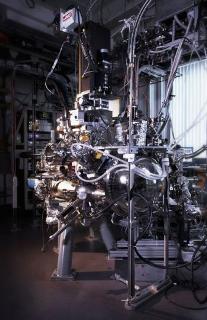Mar 26 2015
An international team of researchers has used infinitely short light pulses to observe ultrafast changes in the electron-level properties of superconductors, setting a new standard for temporal resolution in the field. It was an exciting challenge to merge completely different results and approaches, such as ultrafast laser optics, photoelectron spectroscopies and first-principles theory.
 This ARPES chamber (angle-resolved photoelectron spectroscopy) was used to probe the velocity and direction of motion of electrons in solids at equilibrium, as well as in time-resolved operation when combined with the use of an ultrafast laser system as the photon source.
This ARPES chamber (angle-resolved photoelectron spectroscopy) was used to probe the velocity and direction of motion of electrons in solids at equilibrium, as well as in time-resolved operation when combined with the use of an ultrafast laser system as the photon source.
The scientists—from the Università Cattolica del Sacro Cuore, the University of British Columbia (UBC) and other institutions—liken the new technique to the development of high-speed film capture in the early days of photography.
“The solution we devised is based on the use of ultrafast light pulses, lasting 10 femtoseconds or 10 million billionths of a second,” says Claudio Giannetti of the Università Cattolica del Sacro Cuore, Italy, and an international visiting research scholar at the UBC Peter Wall Institute for Advanced Studies, who coordinated the research.
A major hurdle in understanding the emergence of superconducting properties is determining whether the electron interactions occurring inside the materials are direct and instantaneous, or mediated by some delayed interaction. The advanced techniques—much like the high-speed photography invented by Eadweard Muybridge more than 100 years ago to film galloping horses—helped the researchers ‘slow down’ and observe the process.
“It was an exciting challenge to merge completely different results and approaches, such as ultrafast laser optics, photoelectron spectroscopies, and first-principles theory,” says professor Andrea Damascelli, director of UBC’s Quantum Matter Institute (QMI) and senior fellow with the Canadian Institute for Advanced Research Quantum Materials Program. Damascelli led UBC’s research component of the project.
The snap-shot observations, detailed this week in Nature Physics, support the hypothesis that electron interactions are delayed and mediated by their interaction with the spin and magnetic pull of other electrons. The process took only 10 femtoseconds—something that, up till now, material scientists had been unable to directly observe.
Adds Damascelli, “These international collaborations are vital to achieving this calibre of work, and the possibility of combining cutting-edge photoelectron spectroscopies with state-of-the-art ultrafast techniques will be an exciting new avenue in UBC's research portfolio as our capacities grow.”
International Collaborators
The research also included researchers from Politecnico of Milan, SISSA in Trieste, and the Jožef Stefan Institute in Ljubljana, Slovenia. This is part of an ongoing collaboration between QMI and the ultrafast optics groups in Europe. Damascelli and Giannetti have been awarded a Peter Wall Institute International Scholarship aimed at reinforcing their collaboration and developing novel experimental ideas and dedicated infrastructure based at UBC.
Source: http://www.phas.ubc.ca/